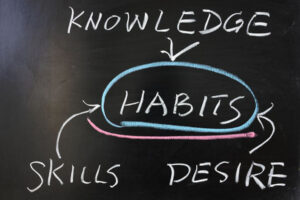
A major challenge in leaving your comfort zone has to do with your habits. Your habits have great control over what you think, what you speak, what you do and most of them have been a part of you for a long time. Your habits have everything to do with your accomplishments, your level of success in life, or your lack thereof. The blessing and the curse that lies in our habits is that they help the things that we do in our lives virtually run on autopilot. This is why without the proper habits, most of us stay where we are in life or in the case of bad habits, they allow our quality of life to decline. The good news is that we cannot only learn positive new habits and reprogram old habits, but we can do away with non-useful or negative habits.
Now this is not to say that this can be done without quite a bit of work. To learn new habits or reprogram old habits requires commitment, consistency, effort, attention, and time. While it can range widely from person to person, the accepted time to form a new habit is typically 21 days. It can also take about the same amount of time to rid yourself of old habits that hold you back from accomplishing what you desire most in life. Without a doubt what keeps most people from achieving their dreams in life is taking the time to assess all your habits in every area of your life and determining what habits help you in achieving your goals, and also which habits are destructive to what you’re trying to achieve. This leads us to the first step in the creation of your new positive habits and the elimination of your old, useless, and negative habits. Block out one hour of your day when you can spend some focused, uninterrupted time with some paper and a pen (and yes handwriting this exercise is necessary if you truly want to make a difference in your life). By handwriting your existing habits, and your goals, and determining which new habits you will have to cultivate to achieve your goals; it will give you a reference to turn to when things become difficult in breaking old habits and creating new ones.
We all know how hard old habits can be to break and new habits can be just as hard to form because you will not only encounter great resistance in creating them but often along the way we can lose focus and question while we are doing this in the first place. A great example of this is in getting our health on track, especially if we are out of shape and have not been eating well or exercising on a regular basis. While it is easy to think about the benefits of getting yourself in shape and it is exciting to take out the new gym membership, after about the first one to three workouts (when your muscles are aching and the last thing you want to do is trudge back to the gym to endure even more pain) you think to yourself “what the hell am I doing”? You begin to question “Why did I start this in the first place”? If you are serious about developing this new habit of eating better, working out, and taking better care of yourself; it is at that moment you need to refocus on your goal of getting yourself in the best shape of your life.
What you need to know is that changing your habits is one of the key points necessary if you plan to leave your comfort zone behind and move forward with the pursuit of the life you’ve always dreamed of, the one that you’ve always desired to live. But in the process of getting motivated to change your habits, one thing you do not want to do is try to change or create too many habits at once. That is a recipe for failure.
Depending on your fortitude and commitment it may take less than, or more than, 21 days to change your habits. But rest assured, the rewards outweigh the sacrifices and the things that you will be able to achieve in the future may very well astound you (and even some of those who said you could never do it). Now that you know what to do, there’s no time like the present, let’s do it!
“We all know how hard old habits can be to break and new habits can be just as hard to form because you will not only encounter great resistance in creating them but often along the way we can lose focus and question while we are doing this in the first place.”
By: T. Michael Fairchild, MCC

